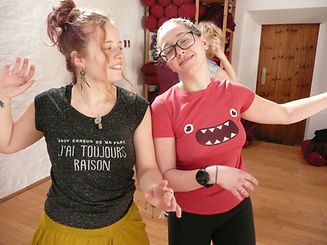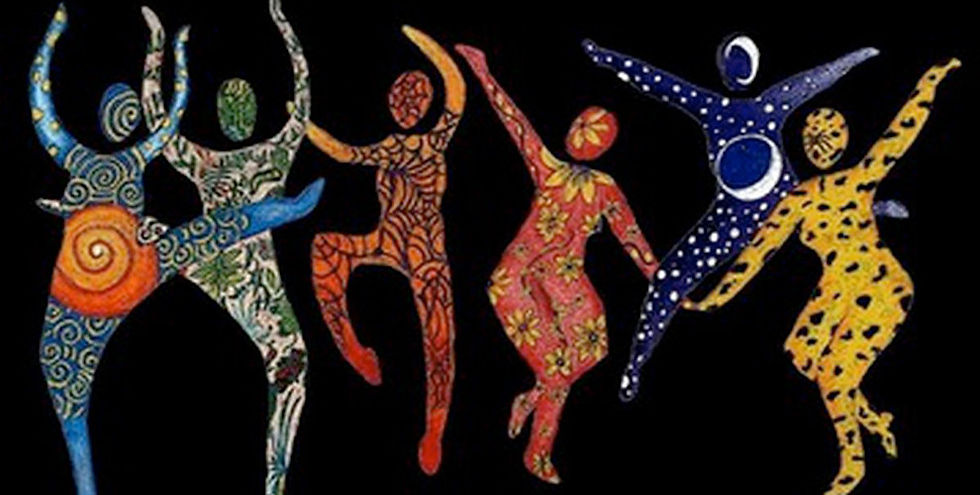
A short introduction...
Let’s play! For children it is easy to start just like that. Within moments a world is
created, and depending on what and where the players find themselves, it is peopled by
princesses, cowboys, or space travellers. Everyone takes a part, and the change between roles, as the game evolves, is fluid and without effort. Everyone’s unique take can shape this play. – Adults, if they play at all, often engage in games, which, by contrast, mostly have clear rules. Often it pits one person or team against the other, and the aim is to win over the opponent.
How would it be if adults could engage more in playing again? The importance of play,
improvisation, and not taking ourselves too seriously has a long tradition, also for grown-ups. Maybe there can be links to the dances, rites, and rituals of indigenous societies, which allow us to experience ourselves as being part of something greater and find our place amongst other people and nature, connected with gods and spirits. Jesters, fools, or clowns have found different forms in different societies to keep in check any individual that sought to become independent from their context, their ground, and stand above it all to exert power over others, over nature—at times seeing themselves as being able to challenge the gods. Their downfall is well documented in tragedies from Greek Theatre to Shakespeare and in many traditional tales.
For upcoming open courses, and possibilities of team-training, see below.
Listen to the interview with Andrew Morrish, performer and improvisation teacher, and Jaya, discussing improvisation, meditation and how they are connected.

How can playfulness help us to participate in the unfolding moment?
Stephen Nachmanovitch, violinist, improviser, and author of ‘Free Play’ describes the
moment where improvisation happens: “It is awareness of context and willingness to listen to each other. There is no time for hope of success or fear of failure. You just do what comes: communicate and respond. We co-create something that arises out of listening and mutual attention."
This, I am sure, will be familiar for practitioners of the Dharma and for students of James Low in particular. He often has talked about the practice of dzogchen in similar ways, e.g.: “Proximity to another person is an opportunity to explore new forms of opening or unfolding together, of co-emergence. It will not and cannot arrive anywhere safe. On the level of emerging phenomena, on the level of experience, life is not safe, we don’t know what is going to happen.” Moment by moment we arise from the ground,
find ourselves not-knowing the next moment, together with the world and all others around us.

What does it mean, ‘to play’?
Play-Ground is a space to come together to explore …
-
how does playfulness show itself for me, in life, work or meditation, alone or with others?
-
what helps me to interact in a more playful spirit?
-
how do I notice the feeling, taste or physical sensation of openness, curiosity or lightness?
-
how can I meet others in that spirit or even encourage this in them?
-
how can I notice the uniqueness of everyone’s play and join them in that?
We also look at how it happens that we fall out of play and come more from ‘I am doing it’.
-
what gets in the way and stops me from engaging in the spirit of playfulness?
-
do heaviness, closing or anxiety have a noticeable taste, physical sensation or feeling?
-
if they arise (as they might!) how do I buy into them or layer them with belief?
-
can I notice how it is when others contract – and how my actions might contribute?
Whether in learning, working or meditation, we can directly experience and create conditions for playful creative exchange. We can ease ourselves into being in the Unknown. We can learn the difference between a mode of doing, based on control and trying to get somewhere, and a mode of living in the moment-by-moment revelation of what shows itself to us now, from inside & out. We can let ourselves be filled, emptied and filled again without needing to name & define.




Are the times not too serious for silliness like play?
Maybe the opposite is true. Aren’t a lot of the conflicts we are seeing a direct result of the names and identifications we give to the world and cling to, and then make them more dense with adding value, with good and bad, friend and enemy, etc.? Is not the ecological emergency based in the human hubris that we can be separate from the world and that it is ‘ours’ to use? –Maybe an approach of play, and ourselves as just one equal player amongst others, is exactly what can support us in a different way of being with each other and the world.

So, how, when and where are we meeting up to play?
Like a playground might have swings, slides and carousel, we might find our mood of play with colours & paints, with words or interactions, with physical movement, improvisation & dance, imagination or music. Just as we might love the swing more than the carousel, we might discover our ability to play emerges more easily in one of those. It does not matter. We start with ease, just where we feel drawn to or what we are curious about, and proceed from there.
This is an invitation for people from all walks of life, to meet in the spirit of play. Would you like to explore the possibilities of creativity and play with your work collegues? Please get in touch to explore the possibilities. We have run very successful projects with the North London NHS Mental Health Trust, Volunteer Scotland and other companies.
Also, from November, there will be online opportunities to let our meditation practice be infused and ‘en-light-ened’ (as in ‘less weightfulness’) with a playful spirit.
Join every Wednesday morning for a drop in class (7:30/8:30 am, UK time) from 12 November


